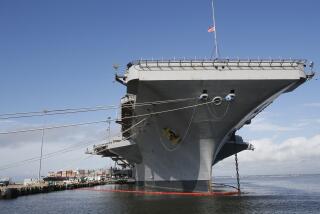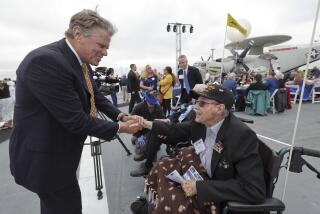Adm. Zumwalt, Retired Navy Chief, Dies at 79
- Share via
Retired Adm. Elmo R. Zumwalt Jr., who modernized the American Navy through scores of infamous “Z-Gram” directives as its top uniformed commander in the early 1970s, and became personally embroiled in one of the Vietnam War’s major legacies--Agent Orange and its effects--died Sunday at 79.
Zumwalt died at Duke University Medical Center in Durham, N.C., after a series of surgeries for cancer. Born and reared in Tulare, Calif., he had lived in McLean, Va., a suburb of Washington.
Zumwalt served as a remarkably innovative chief of naval operations from 1970 to 1974, claiming that he gained his insights into the need for personnel reform from his two years as commander of youthful Navy forces in the Vietnam War.
“I want to make the Navy a place where the activities of reasonable young men have full play,” he told The Times and other news media shortly after moving into the prestigious Pentagon office.
He gained darker insights in Southeast Asia as well: extensive knowledge of Agent Orange, the chemical defoliant containing toxic dioxin which he believed caused the 1988 death from cancer of his own son, Lt. Elmo Zumwalt III, and the learning disabilities of a grandson.
Steadfast in his belief that he had been correct to order widespread use of the defoliant in Vietnam, the retired admiral also campaigned relentlessly for more research into its deadly effects on servicemen and others who came in contact with it.
Largely because of Zumwalt’s efforts, the Department of Veterans Affairs now provides medical treatment and payments for various cancers and other diseases associated with exposure to Agent Orange. Zumwalt served as chairman of the National Marrow Donor Program, saying that work and his other efforts would stand as a memorial to his son, who became a lawyer after the war.
“No one has done more to face the consequences of Agent Orange and provide benefits to sick vets,” Bobby Muller, president of the Vietnam Veterans of America Foundation, said Sunday in Washington, D.C. “Not many military officials now want to deal with Agent Orange exposure.”
In 1986, two years before his son’s death, Zumwalt and the stricken son published a book, “My Father, My Son,” describing their ordeal.
“The Zumwalts’ book is a dual biography of a father and son whose lives became entwined, and eventually consumed, by the use and after-effects of Agent Orange,” wrote producer Martin M. Goldstein, who created a television special about the defoliant, in reviewing the book for The Times.
“We feel as if we have opened a family photo album and caught people just as they are, or as they want to be seen not for the public, but for each other. The mutual love and respect within the Zumwalt family, and especially between father and son, is especially appealing--though ultimately haunting.
“Love, duty, honor, courage are not just words to them but the fundamentals of their lives,” the reviewer wrote. “They are the living embodiment of American idealism and commitment.”
In 1995, Zumwalt, whose other son, James, also served under his command in Vietnam, became America’s highest-ranking officer to return to the war-ravaged country. He told Vietnamese President Le Duc Anh then: “I have felt a very special responsibility to help deal with the wounds of that war.”
But even during that pilgrimage, he reiterated that given the same circumstances, he would again order use of Agent Orange. He said it reduced casualties of Navy personnel from 6% a month (which he said gave the average naval person a 70% probability of being killed or maimed during a year’s tour) to 1%.
He also said that although he and his late son believed Agent Orange ultimately killed the younger man, it also extended his life by 13 years because, without it, the young lieutenant would have been shot to death by a brush-camouflaged North Vietnamese soldier.
“Neither he nor I have ever had a feeling that was in any way related to guilt,” Zumwalt told newsmen accompanying him to Vietnam in 1995, “but just a sense of tragedy that I was the instrumentality of his final end.”
During his four years at the Navy’s helm, Zumwalt also shook up the traditional service by ordering equal opportunity for all, particularly blacks, Filipinos and women--and cracking officers’ heads when they balked at following those Z-Grams.
Critics blamed Zumwalt’s relaxed restrictions for racial outbursts that occurred on ships and at Navy bases during his tenure. But he assured a restive Congress that discipline was being maintained while eased regulations were improving sailors’ lives.
Adm. Jay Johnson, the current chief of naval operations, praised Zumwalt on Sunday for “his bold, visionary leadership” and said Zumwalt’s actions “had profound impacts on the size, shape and culture of our Navy, which are still evident today, nearly three decades after his watch.”
Considered “mod” for his modern thinking in that era or “mad” for initiating outlandish changes, Zumwalt earned the admiring nickname of that other hero who made the sign of the Z--Zorro--from the enlisted personnel whom he made happier. The same Times writer who in 1970 called Zumwalt “the psychedelic admiral” also noted that he was “probably the most with-it chief in naval history [whose] personal, humanizing touch already has been felt in a service that breaks with tradition only in pain and anguish.”
Among those early 1970s Z-Grams were directives permitting neatly groomed mustaches, beards, sideburns and long hair, alcohol in barracks, hard-rock music clubs, and greater responsibility for junior officers.
Also included were the most sweeping changes in sailors’ uniforms in Navy history: swapping the traditional round hats, collared “blouses” and 13-button bell-bottom trousers for blue suits that look much like officers’ garb.
“My theory,” said the then-new naval operations chief, “is that we should treat our naval personnel as grown and mature citizens.”
Some officers and politicians intermittently called for his ouster, but Zumwalt merely reminded them that the Navy’s tardy abolition of flogging as a punishment in 1850 had also been unpopular with a few.
Aside from his efforts to create an enlistee-friendly Navy, Zumwalt also worked to increase the service’s defense capability. In the early years of military downsizing, he equipped the diminishing number of ships with more sophisticated and efficient weapons.
Back home in Tulare, where he was born to husband-and-wife physicians on Nov. 29, 1920, they called him “Admiral Bud,” named a park for him and in 1972 held what the town billed as “rowdy-ow-dow Z-days” to celebrate his success.
Zumwalt had been a football tackle and class valedictorian at Tulare High. He was an Eagle Scout at age 16 and a junior Red Cross volunteer who distributed food to migrant farm workers around his San Joaquin Valley community, signaling early his humanitarian nature.
He planned to become an Army doctor, and marked time studying at Rutherford Preparatory School in Long Beach while waiting for an appointment to West Point. But suddenly enamored of the sea by the stories of an Irish whaler who visited his parents, he switched his request from the Army to the Naval Academy.
At Annapolis, he was a company commander, Trident Society president, twice winner of the academy’s public speaking contest and a champion debater, which would help him years later in his repeated testimony (critics called it excessive lobbying) before Congress.
As Contemporary Biography has noted, Zumwalt’s relaxed attitude about regulations may have been presaged by his standing among his class of 615; he graduated cum laude, 24th scholastically, but 275th in conduct.
Commissioned in June 1942, Zumwalt served on destroyers during World War II--where, a colleague revealed, he was seasick for the first three months. A lieutenant commander by the Korean War, Zumwalt was navigator of the battleship Wisconsin, and later commanded destroyers and the guided missile frigate Dewey.
He was a precocious achiever--at 44 the Navy’s youngest officer ever promoted to rear admiral and at 49 its youngest chief of naval operations.
After his retirement from the Navy, Zumwalt in 1976 published his first book, “My Watch,” and ran unsuccessfully in the Democratic primary for U.S. Senate from Virginia.
President Clinton crowned the admiral’s battery of awards two years ago by giving him the Presidential Medal of Freedom.
Zumwalt is survived by his wife, the former Mouza Coutelais-du-Roche, a Franco-Russian whom he met and married in Shanghai in 1945; and their three younger children, James, Ann and Mouza C.; a sister and a brother, and six grandchildren.
More to Read
Sign up for Essential California
The most important California stories and recommendations in your inbox every morning.
You may occasionally receive promotional content from the Los Angeles Times.













